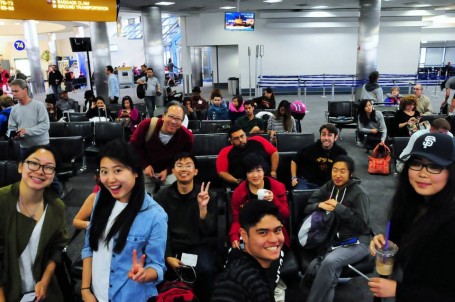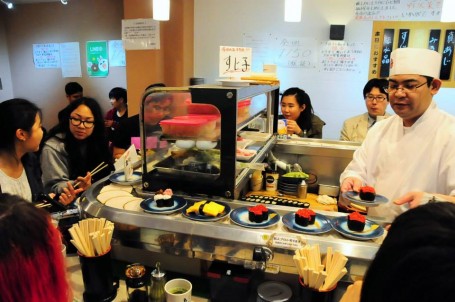By: Luis Vidalon-Suzuki
The day had finally come! We would finally be leaving Los Angeles to travel to the fascinating and unfamiliar country of Japan. Most of us did not sleep a wink the night before, yet we all remained wide awake due to the excitement of the adventure to come. In the airport, we navigated around the busy foot traffic of tired travelers and found our way to our gate. Witnessing the diversity of the individuals in the terminal, I recalled Ms. Ryoko Nishijima’s presentation about critical tourism. As gaijin (foreigners), we needed to accept the Japanese culture while simultaneously analyzing, diagnosing, and criticizing certain aspects of Japanese culture in an objective manner. Each one of us students would begin observing how globalization has affected the romanticized country.

Before our eleven-hour flight, we all forced a smile on our painfully tired faces in our terminal at LAX.
After a long eleven-hour flight, we exited our plane enthusiastically, realizing that we were walking on the other side of the globe. Noticing the Japanese characters on the signs, there was no doubt that we were no longer in the Western Hemisphere! But Japanese was not the only language written on the walls. Alas, an astonishing amount of English translations were conveniently placed next to the Japanese to make it easier for non-Japanese speakers to take in the information. Even though the English language had permeated the Japanese language and culture, the most shocking moment came when we went to the train station. The very first business that we saw was Starbucks Coffee! Interestingly, our initial encounter with a business in the Japanese station was with a foreign company. And this encounter was not exclusive to Starbucks; when we arrived to Tokyo, we were bombarded by signs advertising H&M, McDonald’s, and Louis Vuitton. Before we even arrived at the Sakura Hotel in Jimbocho, it became apparent that Western influence and language had made a deep mark on the Eastern culture. In fact, it had been ingrained and intertwined into everyday life, making the English language a powerful apparatus within Japanese society.

As we eat our first meal in Japan at a conveyor-belt sushi restaurant, it is easy to recognize the English menu provided by the workers. This seems just one example of how Japanese society has acclimated to Westernization.
English has clearly made a mark here in Japan. Becoming a seemingly significant part of the culture, I wonder how the intrusiveness of the Western language affected other parts of daily life. In this trip, I am researching how Westernization of Japan has developed curriculum so that English seems like a necessary and beneficial subject to teach in the public education system. As a foreign language, it is fascinating how English has become an integral part of Japanese society; even something as simple as writing romaji on the billboards subtly coerces each person who reads it. As a critical tourist, it is imperative that I continue to observe language in this manner throughout my time in Japan. Realizing the subtle importance of certain factors is imperative to developing thought-provoking discourse about the alterations to the Japanese language. As a personal goal, I intend to go about each day examining the culture while simultaneously enjoying my invaluable time in this new country. I cannot wait to see how each one of us will develop in regards to personal growth and academic progressions in the next two weeks!

Here we are trying to look pretty next to Miss Universe Japan, who we spotted in LAX. As a half-black and half-Japanese woman, her coronation as Miss Japan sparked intense controversy about race and what it means to be Japanese. She is a walking example of how foreign influences have affected Japanese culture.
